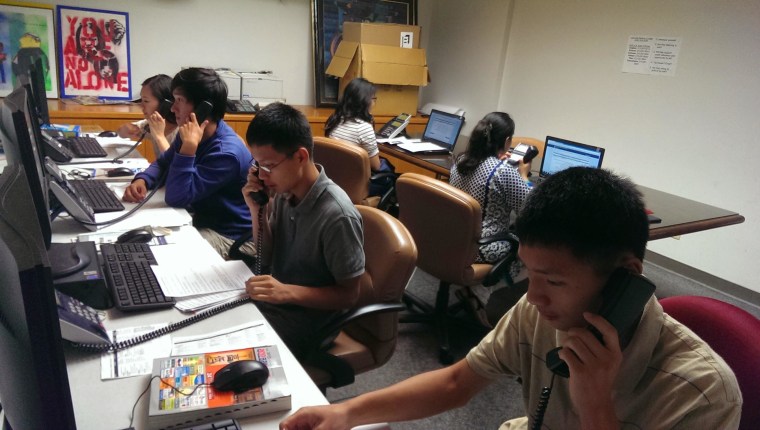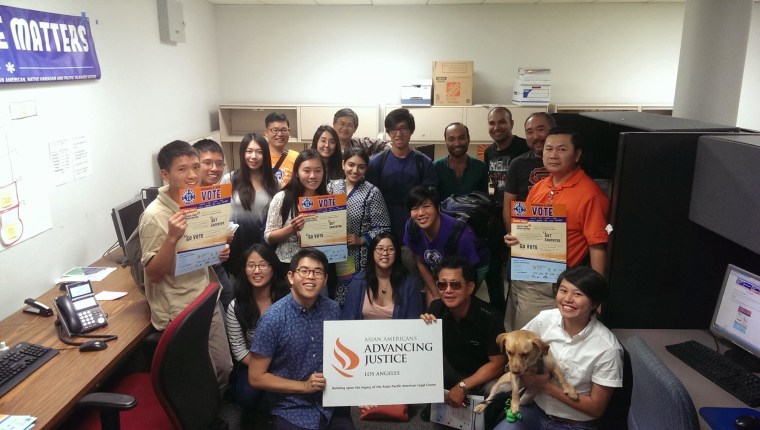In 2012, eight percent of eligible Asian-American voters cited their limited English proficiency as the reason they did not vote. Because Asian American voter turnout has the potential to affect election results, community organizations have prioritized working to help eligible Asian Americans overcome language barriers tomorrow's midterm elections.
A new study by Advancing Justice AAJC, “The Right To Assistance Of Your Choice At The Polls: How Section 208 Of The Voting Rights Act Should Work To Protect Our Vote And Our Democracy,” documents many incidents across the country of how misunderstandings of Sections 203 and 208 of the Voting Rights Act prevent eligible voters from voting. It also offers recommendations to overcome language barriers and ensure all eligible voters can do so.
Section 203 of the Voting Rights Act was added by Congress in 1975, requiring that ballots and other voting materials be translated into minority languages in areas that meet certain demographic criteria. However, Section 203 does not apply to all areas of the United States.
Section 208 of the Voting Rights Act, added in 1982 by Congress, allows any eligible voter who needs assistance at the polls because of blindness, disability, or inability to read or write to bring a person of his or her choice into the voting booth to assist with the voting process.
“For Limited English Proficient (LEP) voters, this could mean the difference between casting their ballot and not participating in the democratic process"
“There is no barrier as to who can help a voter,” said Mee Moua, Executive Director and President of Advancing Justice | AAJC, “so long as it not their employer or a representative from their union. The voters can bring their minor child or even an unregistered voter into the voting booth with them.”
“For Limited English Proficient (LEP) voters, this could mean the difference between casting their ballot and not participating in the democratic process,” said Moua, “After all, during the 2012 elections, we found that the turnout rate for Limited English Proficient Asian-American voters was nine percent lower than those who were English proficient.”
In order to help boost that turnout rate, Asian American community groups across the country are reaching out to eligible voters with multilingual phone banks.

“As far as politics are concerned,” said Tanzila Ahmed, Advancing Justice - LA’s voter engagement manager, “[Asian Americans and Pacific Islanders] are often left out of the conversation. Mainstream politics ignore this group, citing their non-partisan tendency as unpredictable, or their in-language needs too difficult to figure out. But by being left out of the political conversation, AAPI communities are disengaged by the political process.”
In California, Advancing Justice – LA, in partnership with 14 community groups and four youth groups, has organized the nation’s largest multilingual and culturally-appropriate phone bank, “Your Vote Matters! 2014,” which is calling California voters in 17 languages—including Arabic, Bangla, Burmese, Cantonese, Mandarin, Khmer, Tagalog, Hindi, Japanese, Korean, Malay, Urdu, Punjabi, Samoan, Thai, Tongan and Vietnamese—to encourage them to vote.
“Why are we using 17 different languages?” asks Ahmed, “Because we are in Los Angeles.”
“With each call, we are inviting the AAPI community into the political conversation"
The multilingual phone bank is a critical tool for the Asian American community where 44 percent of Asian American adults have limited English proficiency, in part because 61 percent are foreign-born or naturalized citizens.
“With each call,” said Ahmed, “we are inviting the AAPI community into the political conversation - in their language and using people of the same community they are from.”
Voters who have questions or discrimination problems at the polls on Election Day can call the multilingual (Bengali/Bangla, Cantonese, Hindi/Urdu, Korean, Mandarin, Tagalog, Vietnamese) Election Protection Hotline run by Advancing Justice | AAJC and Asian Pacific Islander American Vote (APIAVote) at 1-888-API-VOTE.
